The supernatant recycling system installed at Bathurst Council’s water filtration plant, left, is just one example of CST Wastewater’s technology that will be showcased at Food Tech. CST Managing Director Mike Bambridge, right, will be on hand to share his decades of expertise in the water, wastewater and green energy industries.
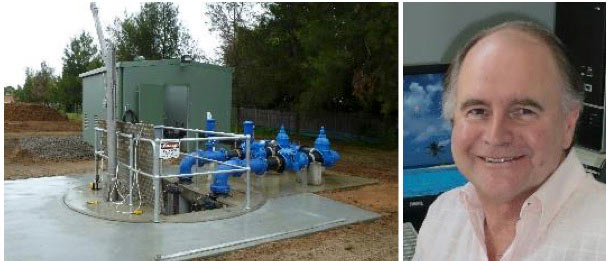
Leading exponents of locally and globally successful wastewater-to-energy projects for agribusiness and industry will feature on the CST Wastewater Solutions stand F30 at the Food Technology exhibition in Queensland from June 26-28.
World class technologies that will be showcased include the Global Water Engineering (GWE) Covered High Rate Anaerobic Lagoon (COHRAL) installed at Oakey Beef Exports’ abattoir on Queensland’s Darling Downs and the GWE Rapid Transformation of Organic Residues (RAPTOR) utilised by Chok Chai Starch in Uthani Thai, Thailand to covert cassava pulp into biogas. (Further details on these projects below.)
CST Wastewater Solutions Managing Director Mr Mike Bambridge will be on hand to discuss these latest wastewater and green energy technologies that not only clean wastewater to top world standards, but also extract biogas to substitute for fossil fuel in boilers and to generate electricity.
The technologies – which can repay the cost of their installation in as little as two years – will be explained by Mr Bambridge, who has decades of experience in assisting organisations manage energy, greenhouse gas emissions, and the impacts of climate change.
CST will also be exhibiting its water recycling technology, which is used to treat water to levels that are safe for drinking. Technologies involved in this process include membrane, ultrafiltration, reverse osmosis and water recycling. This is particularly relevant to local councils and municipalities across Australia that are looking for cost-effective and environmentally sustainable methods of treating drinking water.
Another focus for this year will be Dissolved Air Flotation (DAF) system for treating or refining wastewater. DAF’s great strengths as a primary treatment include relative simplicity in installation and proven cost-efficiency in separating oil and suspended solids from wastewater in applications as diverse as dairy, beef, pork poultry, grains, cereals and crops such as beets, cassava, potatoes, soy, wheat, corn and sugar cane.
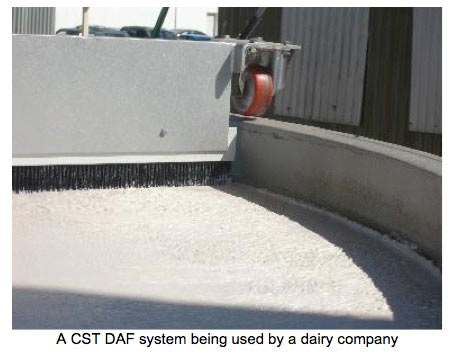
The DAF system uses a unique double-injector air dispersal method that results in an exceptionally efficient separation of solids from liquids. The method works by combining hydraulic distribution and filtration in a single system.
Mr Bambridge will be available to talk through problems and suggest innovative solutions on topics such as:
Low-carbon technologies (renewables, energy efficiency and hybrid systems), particularly waste-to-energy systems
Carbon markets, regulation, programs and mechanisms
Energy management and Greenhouse Gas management plans, verification and auditing
Climate change risk assessment and strategy development
Turnkey contracting for lighting energy efficiency upgrades.
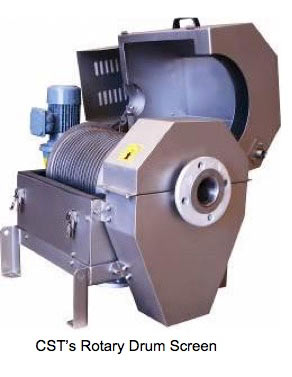 CST has been providing Australasia with a broad range of quality cost-effective water, wastewater and energy solutions for over 25 years. It partners global leaders in their fields, such as Smith and Loveless and also the Global Water Engineering group of companies, which specialises in industrial wastewater solutions and renewable energy solutions
CST has been providing Australasia with a broad range of quality cost-effective water, wastewater and energy solutions for over 25 years. It partners global leaders in their fields, such as Smith and Loveless and also the Global Water Engineering group of companies, which specialises in industrial wastewater solutions and renewable energy solutions
Mike Bambridge will be available to discuss his company’s extensive range of wastewater technologies, including the Rotary Drum Screen pictured right, pretreatment, water recycling, grit removal and anaerobic wastewater treatment.
“The latest Rotary Drum Screen has a low investment cost, as well as low operational and maintenance costs. Our wide range of in-house experience means we offer custom-designed machines if needed,” Mr Bambridge said.
Advantages of the screen, enhancing durability, hygiene and serviceability, include:
- non-lubricated chains and non-metallic drive sprockets
- upgraded running wheel design
- no mechanical parts in contact with screened solids
- corrosion resistant
- designed to handle high fat and grease loadings
- self-cleaning
- optional wedgewire slots or perforated holes screening
Mr Bambridge says CST Wastewater Technologies’ innovative technologies and pioneering projects are particularly applicable to food processing and agribusiness, “so we’re looking forward to showing these capabilities at Food Tech. We’re particularly enthusiastic to show companies how much environmental and profit benefit they can achieve by investing in waste-to-energy solutions that permanently reduce the expense of fossil fuels while radically improving environmental impacts on air and water quality.”
COHRAL™ technology at Oakey Beef Exports
Mr Bambridge will also highlight one of CST Wastewater Solution’s major recent projects, the installation of the world’s first GWE COHRAL™ (Covered High Rate Anaerobic Lagoon) using Global Water Engineering (GWE) technology, represented by CST in Australia and New Zealand.
The COHRAL™ at Oakey Beef Exports’ Abattoir on Queensland’s Darling Downs extracts green energy biogas from its waste water streams to replace millions of dollars’ worth of natural gas previously consumed at the abattoir.
At the launch of the Oakey Abattoir COHRAL™ in 2015, former Federal Industry Minister Ian Macfarlane said “Other meat works will follow them. The economic payback period is quite short, so not only will they make the investment, and do things that are good for the environment, but they’ll actually get their money back quite quickly.”
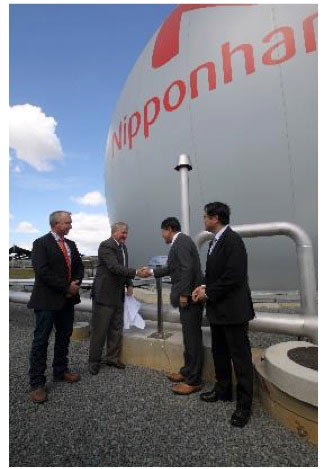
Former Australian Federal Industry Minister for Industry and Science, Mr Ian Macfarlane, second left, performs the official launch ceremony, congratulating the Managing Director of NH foods Australia Mr Takeo Kudo and (right) the General Manager, Overseas Operations Department, Fresh Meat Business Division, NH Foods Mr Norio Itazaki and (at left) the General Manager of Oakey Beef Exports Mr Pat Gleeson.
Oakey Beef Exports General Manager, Mr. Pat Gleeson said “We’re very excited to get this project up and running. It’s a very innovative project; we’ve got an innovative team here at Oakey and this is just another step forward, ensuring that we’re here in the future. We look to reduce our gas usage by 42-50% – so it’s massive. And natural gas costs are only going one way.”
RAPTOR™ Technology at Chok Chai Starch
Groundbreaking RAPTOR™ anaerobic waste water technology with ANAMIX™ thermophilic digester for the processing of waste cassava pulp and its conversion into biogas has been installed by GWE at the Chok Chai Starch tapioca starch plant in Uthai Thani, Thailand.
The Chok Chai Starch RAPTOR™ system greatly reduces an environmental pollution issue by processing and converting to useful green energy the leftover fresh pulp, which starts to ferment once stored. The rotting organic material can generate considerable odour and release heavily polluted wastewater leaching out of mountainous pulp piles.
“Advanced anaerobic technology such as that installed at Chok Chai Starch is also strongly applicable to any factory or process with one or more digestible solid waste streams.” says Global Water Engineering CEO Mr Jean Pierre Ombregt, who has been a world leader in clean water and green energy solutions for more than 35 years.
“Such plants – including breweries, fruit, food waste, agro industries, and energy crops including corn – can easily use this technology to generate energy. It opens the door to environmental and production efficiency gains globally,” says Mr Ombregt.
Chok Chai Starch’s Thermophilic RAPTOR™ – the world’s first plant to incorporate the thermophilic biological digestion process for cassava pulp – not only greatly reduces leftover pulp, but boosts the plant’s existing biogas production to replace fossil fuels and to generate electricity.
The installation also extends the existing benefits of GWE waste water treatment and biogas conversion technologies at Chok Chai Starch. Employed on waste water streams, such technologies can achieve up to 99% COD removal in some types of wastewater (COD, chemical oxygen demand, indicating the amount of organic compounds in water). Existing GWE anaerobic technologies of the type employed at Chok Chai Starch typically produce enough green energy to pay for the cost of their installation in typically one or two years.
The latest technology installed at Chok Chai Starch helps the factory achieve a minimum of 80 per cent conversion of the organics present in the pulp to biogas (methane), treating a maximum of 370 tons a day of wet pulp containing 68,700kg a day COD (chemical oxygen demand). Daily biogas production exceeds 30,000 Nm3 at 60 per cent CH4 content.
The Chok Chai Starch RAPTOR™ starch plant produces enough biogas to generate 3.3-3.4 MW of renewable electricity for sale to the local grid, while the biogas produced by previously installed ANUBIX™ B reactors is heating the factory’s two thermal oil boilers using green energy produced from digestion of organic matter in its waste water.
GWE has been involved in more than 300 water and waste water projects in 60 counties in regions including Africa, North and South America, Australia, China, Europe (including Eastern Europe), Russia and South-East Asia.
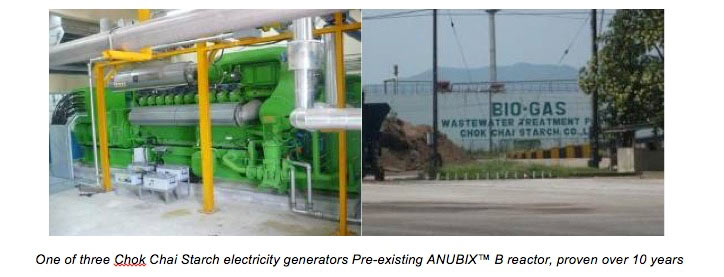
Thailand, along with a number of other ASEAN countries (primarily Indonesia and Vietnam), is among the world’s biggest producers of tapioca starch and derivatives from cassava roots. The industry has hundreds of large factories in the region, with products of tapioca starch and derivatives including sweeteners, modified starches, and, more recently, fuel ethanol.
For further information in Australia and New Zealand, please contact Mr Michael Bambridge, Managing Director, CST Wastewater Solutions, 16/20 Barcoo Street, Roseville 2069. Tel: 61 2 9417 3611 email: info@cstwastewater.com www.cstwastewater.com
